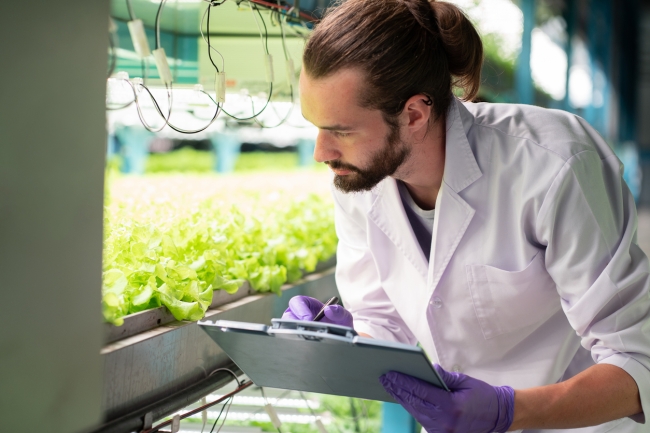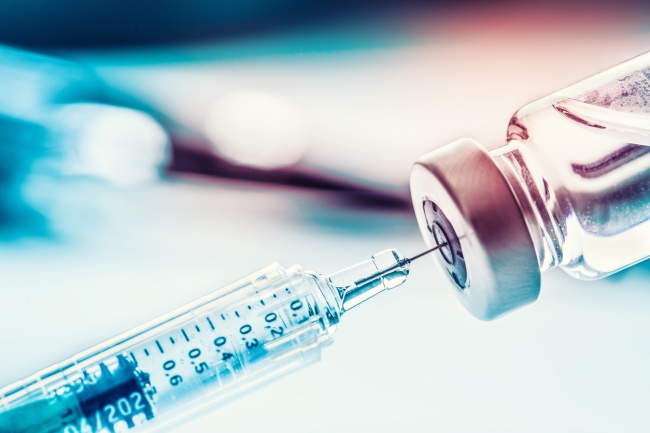4 minute read - 11th April 2023
£24m funding awarded for food and vaccine manufacturing hubs
Two new initiatives, representing an investment of £24m, will help the UK lead the world in preparedness for pandemics and epidemics, and in delivering secure food supplies in step with green priorities such as net zero carbon.
Led by the University of Bath, the Cellular Agriculture Manufacturing Hub aims to transform food production, transitioning to an environmentally, economically, and socially sustainable model in which novel manufacturing systems complement traditional food production. This could reduce carbon emissions and land use by up to 95% compared with traditional meat manufacture, for instance.
Co-led by University College London (UCL) and the University of Oxford, the Future Vaccines Manufacturing Hub aims to make the UK the global centre for vaccine discovery, development and manufacture – and enable the rapid roll-out of highly effective new vaccines for frontline use.

£24m of funding has been awarded for two manufacturing hubs that will focus on food and vaccine research / Picture: Getty/iStock
The Engineering and Physical Sciences Research Council (EPSRC), part of UK Research and Innovation (UKRI), is funding the two new hubs under its ‘manufacturing research hubs for a sustainable future’ initiative. They will run for seven years.
Vaccine delivery fast-tracked
The Future Vaccines Manufacturing Hub is led by Professor Dame Sarah Gilbert at the University of Oxford and Prof Martina Micheletti at UCL. The hub is a follow-on from Vax-Hub, which helped the Oxford University-AstraZeneca collaboration produce one of the world’s first Covid-19 vaccines and deliver 2.9 billion doses to 180 countries worldwide. Involving a wide range of partners, the hub aims to: deliver flexible, innovative technologies that can manufacture many types of vaccine; develop streamlined vaccine manufacturing processes; and make it possible to undertake mass programmes of non-invasive vaccination (e.g. using oral vaccines).
Food production revolutionised
The Cellular Agriculture Manufacturing Hub, led by Professor Marianne Ellis, at the University of Bath, sees EPSRC extending its support into an emerging, potentially game-changing sphere of research. Lower carbon, less pressure on land use, better animal welfare, and less dependent on weather and big cuts in water demand – these could all result from development of cell-level processes enabling production of foodstuffs and the vast array of co-products that are the same as traditional products produced in a system akin to brewing. This hub, too, will harness the expertise and experience of a variety of partners.

EPSRC are funding the two new hubs for seven years / Picture: Getty/iStock
Letting the UK lead the way
Characterised by strong industrial engagement and harnessing a ‘hub and spoke’ model, these multidisciplinary initiatives will complement and refresh EPSRC’s existing portfolio of Future Manufacturing Research Hubs. Each will help the UK achieve global leadership in their spheres, with spin-off benefits in future exports and attracting world-class talent to the UK. A recent report revealed that every £1 invested in manufacturing research generates a £63 return to the UK economy.
George Freeman, minister of state for science, research & innovation, said: “As part of our record £52 billion investment in public research and development over the next three years, we are investing in novel vaccine development, pandemic preparedness, and agri-food security as some of the biggest global challenges we face. The UK has a long history of pioneering vaccine research and development and this funding will help ensure the UK is well placed to help develop the science, technology and innovation the UK and the planet needs to ensure economic resilience in the face of growing global threats.
“With 9 billion mouths to feed by 2050, we need to double world food production on the same land area, using half as much energy and water. We cannot achieve that through traditional agriculture. The Cellular Agriculture Manufacturing Hub will spearhead the development of new processes to produce key food groups like proteins sustainably and cost effectively to feed a growing global population.”
Professor Dame Lynn Gladden, executive chair of EPSRC, added: “Covid-19 has given a graphic demonstration of the importance of vaccine discovery and manufacturing to pandemic preparedness. The need to provide plentiful, affordable, nutritious food supplies across the planet is also one of the 21st century’s big challenges. Our two new Manufacturing Research Hubs will make a game-changing contribution in these areas. Enabling the UK to provide global leadership, they will generate benefits not just in every region of this country but also at national and international level.”